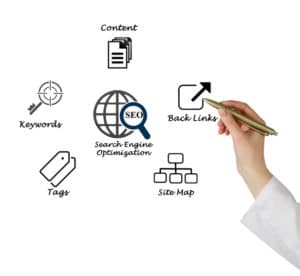
But we’ve never directly addressed the importance the algorithms place on links to your website from other sites. Let’s get into that here.
What is an external link?
Sometimes called backlinks, an external link is simply a link on another website that directs back to your practice website. External links are different than internal links because they move a site user from the site with the link directly to a page on your practice website. Internal links, say from one procedure page to another related procedure page, only move the user around within your practice site.
Why are external links important?
Google wants happy searchers. When a searcher types in a query Google wants to return results that satisfactorily answer the question or get the searcher to the place where he or she can get what they want. Google places a good deal of value on authority. If a person is searching for a dermatologist, Google wants to send them to the website of a local dermatologist who has the most expertise, as this will likely make the searcher satisfied with the search results. As a gauge of authority, Google’s algorithm looks at lots of things such as content, reviews, and keywords.
It also looks for backlinks because it believes they are a key component of a website being an authority. After all, if another website links to your website voluntarily, it’s the ultimate endorsement of the content of the page on your site or of your overall site. Google then elevates the value of your site because of these external links. The more backlinks you have to your practice website, the higher your authority. This is one of the most important components of search engine optimization to improve your rankings in organic search.
Building links
It may seem almost impossible for a medical practice such as a dentist, dermatologist, or plastic surgeon to build backlinks to their website. But if you get a little creative with how you think about this, you’ll see it can be done.
First off, you can’t pay for backlinks. It would be relatively easy to buy links. For instance, let’s say you’re a dermatologist. You could offer the local high school some money for the school to specifically link to your practice website’s “Acne Treatments” page when they talk about acne in the school’s newsletter. Google doesn’t like this, as it assumes you are trying to game the system to create authority.
Here are a few ways to try and build external links to your practice website.
Partner with another practice
No single practice in any medical specialty does everything. Most dentists aren’t oral surgeons, for example. While they may pull the occasional tooth, many dentists do not get involved with wisdom teeth. But if you have a trusted colleague who does remove wisdom teeth, you may want to link to his or her site when discussing the need to remove wisdom teeth on your website. And that oral surgeon can provide a link to your website for the general dentistry procedures that he or she doesn’t provide.
Present at a conference
When you’re a presenter at a conference, this alone is a demonstration of your level of expertise and authority. But Google doesn’t necessarily understand this at face value. However, if on the website for the conference, you are listed with your bio and a link to your practice website, Google now totally gets that you’re an authority.
Even within the conference, there are opportunities to build external links. Let’s say you’re presenting at a conference in an area where you’re the only surgeon using Mohs methods for removing skin cancer. At the end of your presentation, you can post your practice website and ask others at the conference to link to your site if their patients may be in need of this surgical method.
Get involved in the community
If your town hosts an annual health fair and you’re a pediatric dentist, sponsor a booth. There you can give away toothbrushes and dental floss, plus something fun for the kids. You can show how to brush a baby’s teeth, and offer tips on building good dental hygiene in children. In the online listing of participants in the health fair, you’ll earn a link to your practice website.
Hit the media
In most small- to medium-size markets, the local media outlets are looking for content. Everyone is saddled with sagging eyelids as we age and the morning TV news program may want to track one of its anchors as he or she has blepharoplasty (eyelid surgery), following the process from consultation to surgery to recovery. On the TV station’s website, they will provide a link to your practice’s eyelid surgery page or to your home page.
Local papers need content from outsiders, as they have to do more with fewer staff writers. They may be open to a piece from you on a new procedure or treatment. If your dental practice is in an area with many older residents, a story such as “Dental tips when you’re over 60” could be very valuable to the newspaper. The paper will likely allow you to post a link back to your site at the end of the story. Google will see this as a backlink in the online edition.
Directories and review sites
We’ve addressed the importance of ensuring that all of your practice’s pertinent information — such as name, address, phone, and hours — is consistent across the web. At MyAdvice, we have a tool called Local Power that uses a single dashboard to deliver this consistency across over 200 review sites and directories. Most of these directories and review sites provide a backlink to your practice webpage.
Blogs and Facebook
In this month’s first blog, we discussed the importance of having a blog on your practice site. Your blogs can be an opportunity for creating backlinks, but it’s not easy. If you write a blog that is more informational than directly about a specific treatment, it may earn external links, but these can be difficult to garner.
One way to help this happen would be to post a link to the blog on your practice’s Facebook page. Describe the blog on the post and hype it a bit. When your page’s followers read it, they may then pass it along to friends. These then become backlinks to your site.
It’s not easy to build external links to your practice website, but you don’t have to do it alone. At MyAdvice we’ve been building the web’s most beautiful, engaging, and hard-working medical websites for over 20 years. And we’ve been optimizing them for search before anyone had ever heard the acronym SEO. We know a thing or two about building external links back to your practice website. Give us a call or fill out the contact form and let’s get to it.


